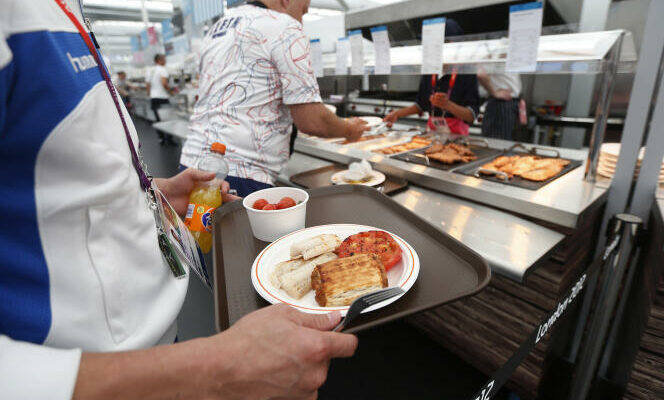One kilogram of CO equivalent2. This should be the average carbon footprint of meals and snacks consumed during the 2024 Olympic and Paralympic Games by athletes, staff, volunteers and spectators. Half as much as for the average meal of a French person. The objective is ambitious, in line with the general course set by the Organizing Committee for the Paris 2024 Olympic and Paralympic Games (Cojop) to halve the climate footprint of this event compared to previous editions, those in London. in 2012 and Rio in 2016 − the Tokyo edition, in 2021, was hit by Covid-19 and took place almost without spectators.
Because the event will also be a huge catering showcase, with around 13 million snacks and meals served in four weeks, Cojop has adopted, in 2022, a food strategy with dozens of commitments: double the share of meat-free dishes served, have 80% of supplies of French origin and a quarter of products from a radius of 250 kilometers around the sites, reach 30% of the overall offer from organic farming or in conversion but also promote all non-consumed foodstuffs, and halve the quantity of plastic compared to previous editions.
The London Games were the first to adopt a “food vision”, especially highlighting the issue of localism – dairy products, beef and poultry had to come from the United Kingdom. Those in Rio placed emphasis on nutritional balance. Displaying a food strategy has since become a mandatory step, requested by the International Olympic Committee (IOC).
The 2024 Games are the first to push the environmental sliders this far. “We placed ourselves within the dynamics of the EGalim law [elle fixe des objectifs à la restauration collective publique]using the certification criteria to set our objectives”says Philipp Würz, head of catering for Paris 2024. The strategy was designed from 2021, during discussions with athletes, nutritionists, agricultural inter-professional organizations, professional organizations and associations.
Although we will have to wait until the end of the Games to check whether the commitments are kept – the Cojop undertakes to provide a precise assessment – Philipp Würz wants to reassure: the commitments made are “contractual” and are binding on all subcontractors.
Up to 40,000 meals per day
The athletes’ village restaurant, which will serve up to 40,000 meals per day, is the space subject to the greatest constraints. The 500 recipes that will be served there have all been approved by the IOC. Among the innovations: there will be no disposable tableware, which gave the IOC some cold sweats, but ended up being validated.
You have 64.31% of this article left to read. The rest is reserved for subscribers.
